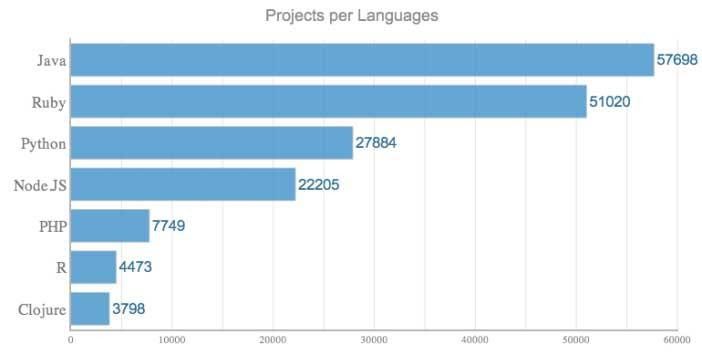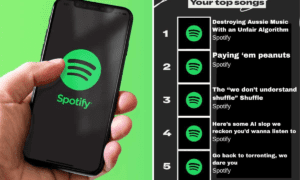The Java programming language continues to be one of the most popular programming languages in the world because of its stable platform, extreme versatility, and use in the mobile development community. It is widely used for a huge range of projects, including desktop, server-side, web, and mobile Android application development.
In fact, GitHub recently ranked Java as the second-most popular programming language among software developers. Other surveys have also found that Java is the most popular programming language for mobile app development. Those are two main reasons why Java developers are among the most in-demand software engineers in the industry.
Java is highly prized for Android development partially because large parts of the Android OS itself were written in Java, and because its APIs are designed for Java.
In addition, it runs smoothly on different hardware platforms, is widely known in the development community, and runs in a virtual machine–and therefore doesn’t need to be recompiled for every phone model.
Some of the most popular applications of Java in the world continue to be Java for Android mobile app development, including Spotify, Twitter, Signal, and CashApp.
Spotify
Spotify is the most well-known music streaming application in the world. The company allows users to stream nearly any song, artists, or album ever made with the touch of a button. As a result, this type of service now accounts for over 37% of music consumers.
Founded in 2006 in Sweden, the music platform now has an estimated 217 million active users, 100 million of which pay for the company’s premium subscription service.
In addition, the company also has an estimated 36% of the mobile streaming market share and brings in roughly $1.68 billion in revenue every fiscal quarter.
The popular music streaming firm uses a range of languages for app development, including C++ for the desktop application. The company also utilizes JavaScript for its web application and C for iOS apps.
However, when it comes to Android development Java remains king. That’s because Java is one of two official Android development languages and because Android’s APIs make Java development a much simpler and straightforward process.
The popular social media and microblogging service Twitter is another excellent example of a company that effectively uses Java for mobile development.
Since its founding in 2006, the company has rapidly become one of the most important platforms for regular social media connections, news sharing, and debate in the entire world. Nearly every celebrity, business leader, and political opinionist uses the platform to grow their social network and expand their reach of influence.
As a result, the company’s website is now the 39th most popular site in the world. The company boasts 326 million active users and has a market cap of $26.2 billion.
Twitter has used Java for all of its Android app development needs, primarily because the language works so smoothly across different devices and because it is one of Google’s two accepted languages for mobile apps.
Cash App
Cash App, formerly called Square Cash, is a mobile payment service that allows users to quickly and easily transfer money to one another. Consumers start using the service by creating a unique $cashtag, or username, that is used to send and receive money from others.
Cash App recently announced that it has achieved 15 million monthly active users in May 2019–double the number of accounts that existed at the end of 2017. The company recently opened up Bitcoin trading on the service in 2018 as well, contributing more than $1.7 million in profit to the company.
Cash App’s Android application uses Java for most of its code. That’s because of the language’s flexibility across device and out-the-box security features, which are especially important when dealing with bank accounts. These include its nonuse of pointers, Bytecode, and access control functionality.
Signal
Signal is one of the most popular encrypted messaging services, along with WhatsApp and IMO. The cross-platform service used Java to build its ultra-popular Android application, which has been called “the most secure, privacy-centric messaging app ever made.”
The founders likely chose Java because of its dominance in the Android development community and full arsenal of out-the-box security tools, including class declarations, structured error handling, and code reusability.
The company uses telephone numbers as usernames and end-to-end encryption to safeguard conversations from prying eyes. In particular, the company uses a combination of the Double Ratchet Algorithm, Triple Diffie-Hellman handshake, and pre keys to secure all conversations against hackers.
As a result of the firm’s successful iOS and Android applications, Signal recently received a $50 million investment from the founder of the company’s main rival, WhatsApp. Brian Acton said that he donated the money “to pioneer a new model of technology nonprofit focused on privacy and data protection for everyone, everywhere.”
Looking Forward
Java has dominated the Android mobile app market since the OS was founded in October 2003. The language has been prized for its ease-of-use and flexibility, and because so many software developers are familiar with the language.

However, Java’s dominance may wane in the near future. Google, the company that owns and manages Android, named Kotlin as a new official programming language for Android–and the language is already beginning to make waves in the Android development community.
Other companies, like Evernote, Pinterest, and Uber, have made the language their preferred Android development tool as well. This has resulted in relatively rapid increases in market share over the past two years. Kotlin is now used on an estimated 7.18% of current Android apps and is being used to build roughly 14.03% of new Android apps.
Developers love Kotlin because it is completely compatible with the Java language, meaning that developers can write code in Kotlin that will generate Java code using a converter. It also did away with the null reference exception, reducing the number of app crashes in comparison to Java.
Kotlin-built apps also offer faster performance speed compared to Java because of the way that classes are written. Finally, Kotlin has stronger and more numerous integrated development environments compared to Java–enabling developers to write more readable and clean code.
In Summary
The Java language continues to be the most important programming language for Android app development–as well as one of the most popular languages for general software engineering.
Java developers utilize the language for Android development because it allows them to write simple code that works smoothly across multiple mobile devices. In addition, the Android OS itself is written in Java and many of the APIs are designed for the particular language.
As a result, most of the world’s largest companies continue to write code for their Android development projects in Java. Firms like Spotify, Twitter, Cash App, and Signal all use the language in their ultra-popular Android applications.
The mobile-specific programming language Kotlin will also continue to gain traction in the Android app development market as more programmers turn to the language over Java. Pay special attention to upcoming Java updates that may help the language maintain its market share in the Android development space.



































